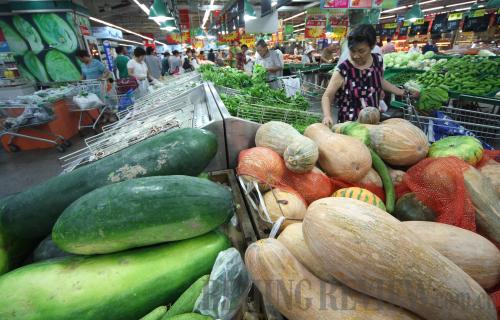|
 |
|
PRICE SENSITIVITY: Residents buy vegetables in a supermarket in Nantong of east China's Jiangsu Province. Surging food prices pushed up China's consumer price index, a major gauge of inflation, to 6.5 percent in July (DING XIAOCHUN) |
Amid the uncertainties of the global economy, China's economic slowdown this year has triggered worries that the country's growth engine is losing steam. Some even anticipate a hard landing. Lu Zhongyuan, Vice President of the Development Research Center of the State Council, dismissed the worries at a recent briefing in Beijing, saying the slowdown is the result of the government's macro-control and is still within the normal fluctuation range. Edited excerpts of his views follow:

China's recent slowdown is the result of short-term moderation to the overheated real economy and the growth rate is still within a normal range. China's economic growth rate is expected to exceed 9 percent this year.
A healthy economic growth rate features fluctuations in a reasonable range that is determined by growth potential. The reasonable fluctuation range of China's economic growth should be between 8 and 12 percent in view of the performance of the national economy since the country adopted the reform and opening-up policy in the late 1970s. There is no need to worry about a hard landing for the Chinese economy, since the recent slowdown in China's economic growth is within the normal fluctuation range.
China's economic growth is moderating. It is the result of the government's macro-control measures.
China's economy is experiencing a series of macro-adjustments in finance and national long-term planning. The adjustments are targeted at cooling the overheated economy and avoiding ups and downs. Slower growth rates will actually help China restructure its economy and reduce energy consumption and emissions.
Amid soaring economic growth no one cares about cutting emissions and saving energy. The call for economic restructuring in an overheated economy is always swamped.
Under the current situation, slower economic growth is consistent with macro-control policies and conducive to controlling total demand and containing rising prices. China's economy can maintain an appropriate and reasonable growth rate.
Even if the growth rate for the Chinese economy decreases to 9 percent or lower, it will still be the highest among the world's major economies, and China will play an important role in stimulating world economic activity and preventing the world economy from slipping into another recession.
The Chinese Government is committed to improving the quality and sustainability in its economic growth through structural optimization and systematic innovation. The ultimate goal of the macro-control is to enable the people to benefit more and equally from the economic growth.
But the country still needs relatively fast growth to create 8 million to 9 million jobs annually until 2015. An annual growth of 3-4 percent in developed countries is not enough to propel China's development as a developing country. If the Chinese economy does not grow at a reasonable rate, there will not be enough job opportunities.
More priority should be given to the quality and sustainability of growth, allowing the Chinese people to benefit more from that growth. Slower growth that is quality-oriented and sustainable can also be a success.
| 